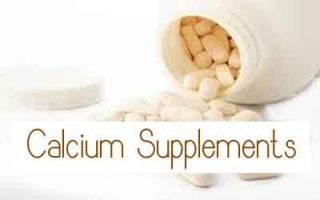- Home
- Editorial
- News
- Practice Guidelines
- Anesthesiology Guidelines
- Cancer Guidelines
- Cardiac Sciences Guidelines
- Critical Care Guidelines
- Dentistry Guidelines
- Dermatology Guidelines
- Diabetes and Endo Guidelines
- Diagnostics Guidelines
- ENT Guidelines
- Featured Practice Guidelines
- Gastroenterology Guidelines
- Geriatrics Guidelines
- Medicine Guidelines
- Nephrology Guidelines
- Neurosciences Guidelines
- Obs and Gynae Guidelines
- Ophthalmology Guidelines
- Orthopaedics Guidelines
- Paediatrics Guidelines
- Psychiatry Guidelines
- Pulmonology Guidelines
- Radiology Guidelines
- Surgery Guidelines
- Urology Guidelines
High dose calcium supplementation safe for heart health in elderly women, finds study

Delhi: There has been a long debate on whether calcium supplementation, particularly at high doses increases the risk of cardiovascular (CV) events in older women. Now, a recent study, contributing to the debate has found that among healthy postmenopausal women calcium supplementation was not associated with adverse cardiovascular outcomes.
The study was presented at the American Society for Bone and Mineral Research (ASBMR) annual meeting.
The study included 121 women, women who were vitamin D deficient, had prior CVD, hyperparathyroidism, or were using bone-active drugs or osteoporosis therapy within the last 3 years were excluded.
The cohort was a mean age of about 60 and had a mean BMI 25.7. Vascular measurements at baseline were within the optimal range, with the group having a mean systolic blood pressure of 112 mmHg and diastolic blood pressure of 72 mmHg. At baseline, daily dietary calcium intake was 851 mg per day.
For this study, the authors used carotid-femoral pulse wave velocity (cfPWV) as an indicator of arterial stiffness and carotid intima-media thickness (cIMT) as an indicator of subclinical atherosclerosis to determine whether calcium supplementation resulted in pre-symptomatic markers for CV disease (CVD).
Also Read: CT Coronary Artery Calcium- Useful tool to predict future risks of heart attack and stroke in young
Key findings include:
- The women who were randomized to take a daily 750-mg supplement in addition to 450 mg through their diet showed no difference in cfPWV and cIMT at 12 months compared with women assigned to take in the same dose of calcium through diet alone or a control group that had no intervention.
- There was also no significant difference between groups in serum total cholesterol and high sensitivity c-reactive proteins.
- Across the study, adherence was good, with 97% of participants taking at least 80% of supplements.
- Patients in the calcium supplement group had a moderately lower total cholesterol than the other two groups, mainly driven by differences in HDL level.
- here was also a significant difference in BMI change at the year mark between the diet and supplement groups.
- No serious adverse events occurred, although patients in the supplement group reported more nausea and constipation, leading to one case of discontinuation.
Also Read: Higher coronary artery calcium levels in middle-age may increase heart failure risk in later life
"These data contribute evidence to the short-term safety of these interventions for calcium intake in healthy, postmenopausal women," wrote the authors.

Disclaimer: This site is primarily intended for healthcare professionals. Any content/information on this website does not replace the advice of medical and/or health professionals and should not be construed as medical/diagnostic advice/endorsement or prescription. Use of this site is subject to our terms of use, privacy policy, advertisement policy. © 2020 Minerva Medical Treatment Pvt Ltd